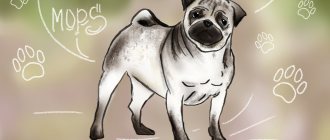Dogs do not know how to hide their emotions, so it is not difficult for people to guess what mood the animal is in at the moment. If your four-legged friend wags his tail and barks happily when he sees his owner, then he experiences a feeling of incredible happiness. However, recognizing feelings of resentment or sadness in a dog is not as easy as it might seem. In this article, you'll learn what might upset your beloved pet and how the two of you can find ways to understand each other. So, we've put together the 10 most common behaviors that can ruin your dog's mood.
You haven't established a daily routine for your pet.
Your dog has a biological clock, so a well-planned feeding and walking schedule is very important for him. Consistency and routine make the world predictable in her eyes, so the animal becomes more confident, which helps reduce stress. Try to feed, walk and train your dog at the same times every day. Just a few days after you start following the daily routine, you will notice that your beloved pet is happier and even more obedient.
“How long can it take to lose weight?”: questions and answers about the keto diet
Russian "Star Wars" fans built a copy of the ship from the TV series "The Mandalorian"
Matcha and chamomile infusion: drinks for sound sleep and a cheerful morning
Favorite activities and active games
You don’t need to force your dog to play and spend time with you, but you shouldn’t leave it unattended either. Try to occupy your dog's time with active games. Long walks, interesting walking areas, squeaking toys and treat toys can distract your pet. The more such leisure time a dog has, the less time he will have to be sad. You can let your pet entertain itself on its own. Specialized toys are suitable for this. They will help solve two main problems: they will occupy the dog during the owner’s absence and will contribute to its mental development.
Also, your pet can be greatly fascinated by the search game. To do this, you need to place your dog’s favorite treats throughout the apartment and let her find them. Start laying out treats in full view of the animal; the first few times the dog should observe the process. After the dog has found them, start hiding the treats out of the dog’s visibility: choose another room for this, places under the furniture, thus placing the treats throughout the apartment.
Do you love dressing up your dog?
If you didn't teach your pet to wear clothes as a puppy, that is, when he was a puppy, it will be quite difficult for you to start doing this later. You can wear a sweater or coat if it’s cold outside and you’re worried that your pet will catch a cold during a walk. But hats and various kinds of suits, which are very popular and fashionable today, cause him complete inconvenience. So it’s better to do without them, so as not to upset the animal again.
You pull on the leash too much when you are trying to forbid your dog something.
Your pet becomes upset if:
- You forbid him to sniff what he wants. Walking your dog is not only a time for him to relax, it is also an opportunity to get to know his surroundings. Without exaggeration, at this moment the pet learns to explore this world. This is why your dog will get upset if you constantly drag him away from trees, borders, flowers, etc.
- You tug sharply on the leash. Dog trainers say that a leash is a means of communication between the owner and his dog. You certainly shouldn't let your pet drag you somewhere. But you can’t pull the leash too hard. If your pet doesn't listen to you, just stop. Once the leash is looser and the dog is looking at you, you can continue your walk. Remember to bring a treat with you every time you go outside to reward your dog's good behavior and obedience.
- A leash that is too short makes the animal nervous. Allowing your dog to walk on a long leash sends the message that you are in control and there is no danger. This will make it easier for you to walk your dog because it won't feel constantly stressed.
Loneliness
An animal can come to terms with loneliness if it has been accustomed to expectations since childhood. But despite this, scientists have proven that a dog can wait painlessly for its owner for four hours. Then she begins to get very bored and show signs of depression.
If you are away from home for too long, you may need to ask someone to walk your dog. As a last resort, provide her with leisure time and leave her favorite toys and treats. Long loneliness will make your pet unhappy and depressed.
You don't take your dog's fear of water seriously.
There are very few breeds that truly love water in all its forms. Here we are talking specifically about bathing. Even those dogs who love swimming in lakes, lying in puddles, and jumping through lawn sprinklers may hate or fear taking baths. They don't like the sound of running water or slippery surfaces - remember that. So, if you want to prevent your dog from feeling stressed at such times, place an anti-slip mat at the bottom of the bath, give him his favorite treat and be sure to praise your four-legged friend for good behavior.
Pipette and baby pacifier. Why do gardeners need these devices?
Feel the freedom: Australian star on how to get rid of the idea of losing weight
Why the collapse of the USSR was predetermined regardless of the outcome of the 1991 referendum
Lethargy as a sign of illness
There is no cause for concern if the dog is sad and lethargic for a short time, say, due to fatigue, but its appetite and stool are normal. But if, in addition to lethargy, there are other alarming symptoms, then you need to quickly arrange an appointment with a veterinarian. The most common causes of weakness in animals are:
- Pain
[2]. If the animal is not only inactive, but also tucks its tail and trembles, does not allow its owner to touch itself and growls, one may suspect that it is in pain. And there are plenty of reasons for this: wounds from bites and burns, various diseases of internal organs, parasitic infestations, and so on; - Stress
[1] is another reason why a dog is lethargic and indifferent to everything that interested him before. Moreover, periods of apathy can be replaced by strong excitement, when the animal constantly barks, howls, ignores the owner’s commands, and may even growl. Under stress, there are often cases of damage to the owner’s things, marks and piles may appear in the wrong places, a perversion of appetite, aimless wandering around the house; - Poisoning
[2]. Lethargy in a dog can be caused by eating spoiled or poisoned food, inhaling toxic fumes, the penetration of snake or spider venom into the body, or taking certain medications. At first, the poisoned animal is worried, but gradually weakens, its breathing becomes noisy, vomiting or diarrhea may be present, the temperature drops or rises, saliva runs from the mouth, convulsions occur, the mucous membranes change their usual shade (turn pale, blue or red). The animal may lose consciousness; - Infectious diseases
[2]. Almost always, a dog does not eat and is lethargic when there is a viral (adenovirus type 1 and 2, canine distemper, etc.), bacterial (leptospirosis, salmonellosis, borreliosis, clostridiosis, etc.) or fungal (dermatophytosis) infection of the body. There are many symptoms of the listed diseases, they vary depending on the type of pathogen that provoked the disease. But whenever there is an infection, the dog refuses to eat and play; - Oral diseases
. The dog is lethargic and does not drink (or drinks, but very little), and also refuses food if it has one of the following diseases: stomatitis, gingivitis, periodontal disease. With such ailments, the animal’s gums are swollen and red, an unpleasant odor emanates from the mouth, saliva runs (with or without blood), the fur in the neck area is constantly wet, there may be ulcers on the oral mucosa, and plaque on the tongue; - Oncology
[1]. The development of a malignant tumor almost always causes the animal to become lethargic and constantly sleep. The pet's weight decreases, the fur becomes dull and falls out easily. Sometimes, with cancer in the later stages, the animal whines pitifully; - Diseases of the digestive system
[1]. With gastritis, stomach ulcers, colitis, enteritis, the pet always looks weak, lethargic, eats little, there may be fever, diarrhea (blood or mucus may be present in the stool, feces are smelly), nausea and vomiting, rumbling in the stomach, flatulence. And if there are problems with the liver (hepatitis, fatty hepatosis, etc.), the pet refuses to eat, stops enjoying walks and games, feels nauseous, sometimes vomits, the mucous membranes may turn yellow (the whites of the eyes also become yellow), the dog drinks a lot, the urine becomes dark , the color of feces often changes (from light yellow to greenish), lethargy develops, weight gradually falls; - Diseases of the heart and blood vessels
[2]. With such ailments as, for example, hypertension, myocarditis and ischemia, the dog lies apathetically most of the time due to pain in the sternum, may cough and breathe hoarsely, suffer from shortness of breath, and pulse fluctuations. The mucous membranes turn pale, the limbs often swell, and the animal sometimes feels sick; - Diseases of the musculoskeletal system
. With osteoporosis, arthritis, osteochondrosis and joint dysplasia in dogs, the hind legs give way, lameness of varying degrees appears on the thoracic or pelvic limbs, clumsiness when moving, the animals are apathetic, do not run and walk little (severe pain can even completely immobilize the pet), and their weight grows; - Endocrine diseases
, the most common of which are diabetes mellitus, hypothyroidism and Cushing's syndrome. With such ailments, the dog is weak, drinks a lot and urinates often, eats heavily, but, as a rule, loses weight. With Cushing's syndrome, your pet's abdomen increases in volume. Due to endocrine problems, the fur becomes dull and thin, the skin itches, becomes thinner, and becomes covered with wounds that take a very long time to heal. Dry mouth. There may be problems with carrying a pregnancy, some bitches have a disrupted estrus schedule; - Worms
. Lethargy, fluctuations in appetite (some dogs eat a lot, others refuse food), upset stomach and intestines can be signs that parasites are living in the dog’s body. Other signs of helminthic infestations include cough, deterioration of hair (dullness, disheveledness) and skin (loss of elasticity, dandruff), bad breath, the appearance of mucus and blood in the stool (eggs, worm larvae and even adult worms can be found in the stool) , itching of the anus (the dog rolls on its butt on the floor, bites itself in the anus); - Allergy
. Sneezing, mucus discharge from the nostrils, tearing and redness of the eyes can be due to an allergic reaction to, say, food components, medications, shampoos, flea saliva, dust, mold, pollen. Other allergy symptoms include severe itching of the body (the dog is constantly itching), swelling of various parts of the body, peeling and wounds on the skin from scratches and bites, noisy breathing, decreased appetite and weakness; - Anemia
[2]. Does the dog constantly sleep and even in rare moments of wakefulness looks tired and apathetic? Perhaps the whole point is the development of anemia - a lack of hemoglobin and red blood cells in the blood. With this disease, animals eat little, the dogs' gums are pale. Blood pressure drops and the pulse is high; dizziness is often present, as a result of which the animal walks staggering; - Kidney diseases
[2] (urolithiasis, renal failure, pyelonephritis, glomerulonephritis, etc.). If the pet is lethargic and does not drink water, or drinks more than usual, suffers from swelling and frequent painful urination, it can be assumed that its excretory system is not in order. The main signs of kidney problems include changes in the amount, smell and color of urine (urine comes out less or more than usual, it smells strong and may be bloody), vomiting, pain in the lower back (the dog spends a long time looking for a comfortable position to sleep, complaining whines).
You raise your voice at your dog
If your puppy is not yet trained enough to wait for a walk and leaves puddles on the floor, yelling at him will only make the situation worse. If you physically punish your dog or raise your voice at him, he will not become more trained, he will simply become afraid of you. And this is even worse.
Don't yell at your pet. Dogs are afraid of loud noises. Moreover, they cannot understand what you want from them when you yell, so this is a meaningless number. Gestures will be much more effective. If you are unhappy with your dog's behavior, adopt a posture of your choice and make an upset expression on your face. Usually this is enough for the dog to understand that he did a bad thing and he is to blame.
And one more thing - never use a dog's sleeping place as a punishment. That is, there is no need to tell your pet to go to his place because he is being punished.
You tease your four-legged friend
What is funny to a person can be offensive and offensive to an animal. Imitating barking, pulling a dog's tail, and teasing with food or toys is wrong. You will not achieve mutual understanding in this way; on the contrary, you will spoil him, which will greatly affect the pet’s behavior.
“I like to follow other people’s lives”: Anfisa Chekhova about Instagram addiction
Many years ago, Bradbury predicted Russia's path to becoming a superpower, but on one condition
Twitter will introduce an alternative to Clubhouse - the Spaces application - by April 2021
You don't play with your dog enough and don't spend enough time with him.
If you can't find 30-40 minutes a day to play with your dog, be prepared for him to damage a lot of things when you're not home. Your pet needs to release his energy, and if you can't help him with this, he will find another way to use his power. And this will be something you definitely won’t like.
Playing with your dog is very important. Thus, the animal must develop physical endurance and intelligence. In the first case, practice running, and in the second, for example, you can play hide and seek. This is beneficial both for the pet and for your psycho-emotional state.
Quarrels between households
A bad mood is not only transmitted from person to person. We can infect our pets with negativity, without even thinking about it ourselves.
Dogs are able to empathize with their owner. If they see the depressed state of people after the conflict, then they themselves begin to fall into such a state. It doesn’t matter whether the pet was present during the quarrel or not, he feels depressed and in a bad mood of his beloved owner.
Try to avoid conflicts in the family, then the animals will have a positive attitude.
You leave your pet alone
Dogs are social animals. They don't like being left alone. Of course, you can't spend all your time with your dog while quitting your job. But you can reduce her anxiety level and likelihood of stress in the following ways:
- Spend as much free time as possible with your dog at home. Don't forget to play with your dog.
- Follow the exact schedule. The animal must know the time when you leave the house and when you return.
- Buy a variety of toys to keep your dog entertained while you're away.
Are you depressed?
If you notice that your dog is sad, pay attention to your own state of mind. Your pet is good at understanding your mood, and if you're not feeling well, your dog may become depressed too. The dog is quite capable of improving your mood, but you should try to help him with this. Get ready and go for a walk with the dog. Play with her in the park or at home. As already written above, during the moments of games it will help you forget about all your problems.
Found a violation? Report content
Visit to the doctor
Visiting the veterinarian is a stressful situation for all animals. The visit leaves only negative emotions, as it is accompanied by pain (treatment, vaccinations, examination).
Gain trust in the animal, do not lament or empathize with it. Otherwise, it will be perceived as confirmation of all fears.
Do not rule out that the animal’s ailments and depression are associated with other problems. If a depressed mood persists for a long time, then this is a reason to visit a doctor.











